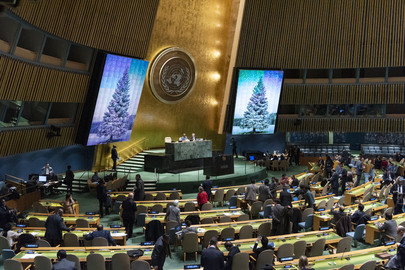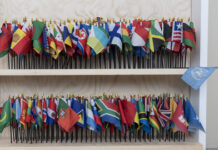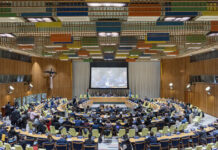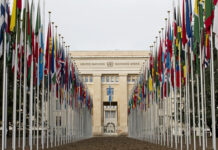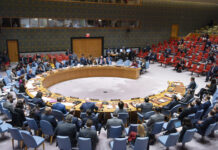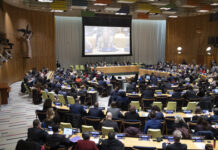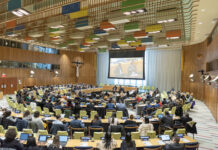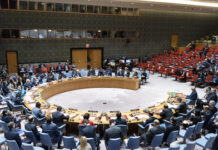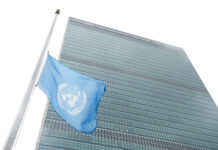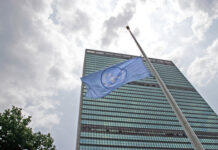“Failure to make progress towards a two-State solution will only increase volatility and risk for hundreds of millions of people across the region, who will continue to live under the constant threat of violence,” he said.
Regional conflict, global impact
With the Middle East “on a precipice”, he appealed for maximum restraint, warning against the far-reaching consequences.
“One miscalculation, one miscommunication, one mistake, could lead to the unthinkable – a full-scale regional conflict that would be devastating for all involved – and for the rest of the world,” he said.
Mr. Guterres reiterated his strong condemnation for Iran’s large-scale attack on Israel on Saturday, and an earlier assault on the Iranian consulate in Damascus which Tehran attributed to Israel, saying “it is high time to end the bloody cycle of retaliation.”
End Gaza hostilities
Stressing that the international community must work together to prevent any actions that could push the entire Middle East over the edge, he highlighted the need for diplomacy that would lead to de-escalation, starting with Gaza.
“Ending the hostilities in Gaza would significantly defuse tensions across the region,” Mr. Guterres said, repeating his calls for an immediate humanitarian ceasefire and the immediate release of all hostages held in the enclave.
“The horrific terror attacks by Hamas and other Palestinian armed groups on 7 October, including mass killings, the use of sexual violence, torture, and the taking of hostages, were an intolerable denial of the most basic values of humanity, and a breach of the most fundamental rules of international law,” he added.
Gaza ‘humanitarian hellscape’
Meanwhile, nearly seven months of Israeli military operations in Gaza “have created a humanitarian hellscape”. Tens of thousands have been killed, including more than 13,800 children, and two million Palestinians are now living under the threat of famine.
Israel recently made several commitments to improve aid delivery, he said. For example, three convoys from the World Food Programme (WFP) were authorized to use the Erez Crossing into northern Gaza to deliver food parcels and wheat flour over a three-day period this week.
Yet, “apparent progress in one area is often cancelled out by delays and restrictions elsewhere”, meaning that “the impact is limited, and sometimes nil.”
‘Quantum leap’ in aid
The Secretary-General called for “a quantum leap in humanitarian aid” to avert imminent famine in Gaza, and further preventable deaths from disease.
Conditions on the ground must also be addressed, so that humanitarian agencies can safely deliver aid, he added, noting that nearly 250 aid workers have been killed, including more than 180 UN personnel.
“Delivering aid at scale requires Israel’s full and active facilitation of humanitarian operations, including through a functioning humanitarian notification system – and improved and direct communications between humanitarians and military decisionmakers on the ground,” he said.
West Bank violence
Mr. Guterres also highlighted “the explosive situation” in the occupied West Bank. More than 450 Palestinians, including 112 children, have been killed since 7 October. Seventeen Israelis, including a child, have also been killed in the West Bank and Israel during the same period.
Additionally, the reported killing of a 14-year-old Israeli boy over the weekend sparked a new wave of armed settler attacks against at least 37 Palestinian villages in the West Bank. Four Palestinians were killed, including a 17-year-old boy.
“The backdrop to this appalling surge in violence is the continued expansion of Israeli settlements – in themselves a violation of international law – and repeated large-scale Israeli operations in Palestinian areas,” he said.
Condemning the violence, Mr. Guterres urged Israel to take immediate steps to end the unprecedented levels of settler violence, hold perpetrators to account, and protect the Palestinian population from attacks, violence and intimidation.
Blue Line, Red Sea
Efforts towards regional de-escalation must also address the extremely fraught situation in Lebanon, particularly along the Blue Line which marks the frontier between south Lebanon and northern Israel, Mr. Guterres told the Council.
“Exchanges of fire between Israeli forces and Hezbollah are exacting a mounting toll on civilian communities in Israel and Lebanon. Dozens of civilians have been killed and tens of thousands displaced on both sides of the Blue Line,” he said, appealing for restraint.
He also drew attention to the crisis in the Red Sea, where Houthi rebels in Yemen continue to attack merchant and commercial ships, disrupting global trade.
“Armed confrontations on this crucial waterway increase risks across the board: risks to supply chains; risks of an environmental disaster from a damaged cargo ship or oil tanker; risks of a serious escalation and a confrontation between major powers, with appalling political, security, economic and humanitarian repercussions,” he said.
He urged the international community to unite to prevent escalation in the Red Sea, adding that the people of Yemen must be supported in their efforts towards a just and sustainable peace.
More to follow…
Source of original article: United Nations (news.un.org). Photo credit: UN. The content of this article does not necessarily reflect the views or opinion of Global Diaspora News (www.globaldiasporanews.net).
To submit your press release: (https://www.globaldiasporanews.com/pr).
To advertise on Global Diaspora News: (www.globaldiasporanews.com/ads).
Sign up to Global Diaspora News newsletter (https://www.globaldiasporanews.com/newsletter/) to start receiving updates and opportunities directly in your email inbox for free.


